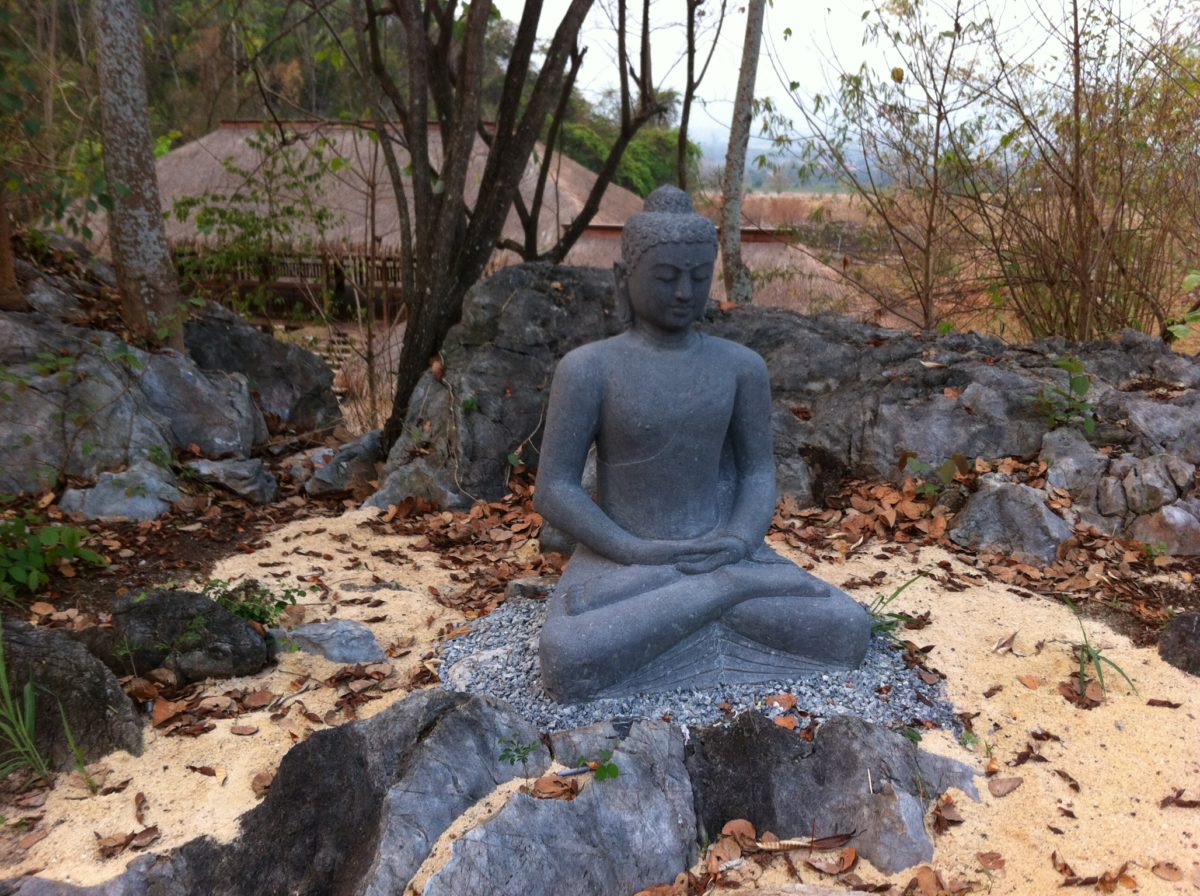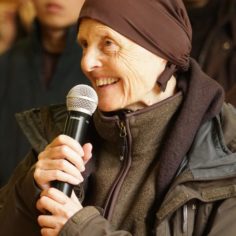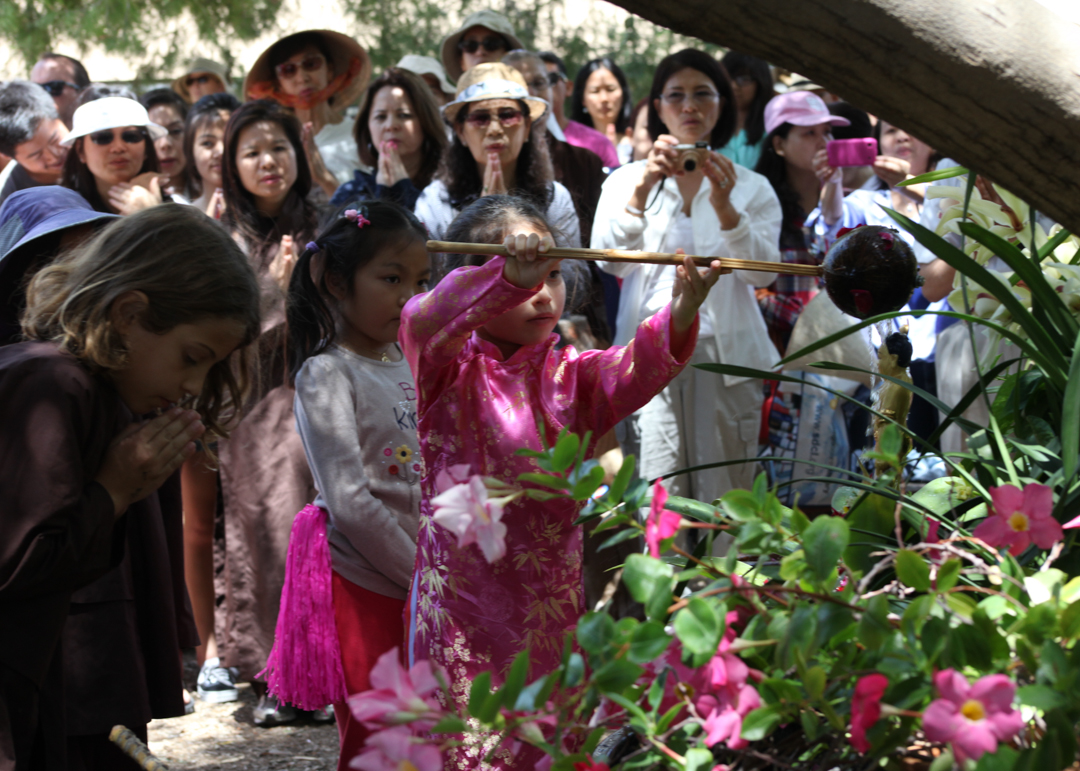By Sister Annabel Laity in February 2015
Thai Plum Village, 24th November 2014

Today, Monday, is usually Lazy Day, but we decided not to have a lazy day in order to support Thay and keep sending good, healing energy Thay’s way, because sooner or later collective energy is stronger than the sum of individual energies.
By Sister Annabel Laity in February 2015
Thai Plum Village, 24th November 2014

Today, Monday, is usually Lazy Day, but we decided not to have a lazy day in order to support Thay and keep sending good, healing energy Thay’s way, because sooner or later collective energy is stronger than the sum of individual energies. So the wake-up bell was invited as usual at 04.00 hours.
Although the day before we had felt determined not to be lazy, the habit energy of sleeping longer on Monday morning was still there. But I told myself, “You must rise for Thay,” so I rose and the little sister in my room rose with me. It was a great joy to step outside under the starry sky, the fresh air, the night fragrance—things I would have missed if it had been Lazy Day. Sitting meditation was a delight. As we concluded the morning practice session we saw the night sky reddening in the east, the daily miracle of a new day. Gradually the red brightened as the darkness receded, and if Thay had not woken me up I should have missed all this.
Then we practised walking meditation outside. I chose for myself the meditation words, “I walk in silence. I walk in the great silence.” I chose these words because I had had a dream in which I was walking with Thay, and at first my mind was wandering and there was the usual mental discourse, but then quite naturally there was a silence which was not only all around me but deep within. The great silence is the silence of the mind, which is not involved in chatter, comparing, seeking, concluding. It is truly an aspect of nirvana in the present moment. We do not have to wait until we die for our mind to be quiet.
Thai Plum Village Sangha is building Thay’s hut here. It is a traditional Thai building that has a thatched roof and has been named “Far Looking Hut,” partly because it has a view of the distant mountain ranges. Thay may not be in the hut, but Thay is also not outside the hut or the mountains that surround it. I practise to touch Thay in everything in the present moment, in my sisters and brothers, in the banana trees. As Brother Phap Lam said before we began walking meditation one day, “Thay is empty of a separate self and we are empty of a separate self and that is why we can walk as Thay in every step.”
The meditation on emptiness is very deep and wonderful. As it says in the Diamond Sutra:
If you look for me in form
Or seek me in sound
You are on a mistaken path
And will not see the Tathagata.
We prepare a hut for Thay in our heart. Then we practise the Ten Mindful Movements in front of the hut. It is body happiness to raise your arms and stretch. We have a right to enjoy body happiness every day. Deep down we have a wish, and that wish has become a hope or a belief, that somehow we shall escape old age, sickness, and death; it is a belief that at least there must be some people, even if a very few, who escape these things. Sometimes disciples ask their Zen master, “Why do you have to get sick and die like ordinary human beings?”1 The truth is that there is no escape from these things and sometimes we need reminders of the truth: “I am of the nature to have ill health and to die and there is no escape from ill health and death.” Once we see this clearly, we enjoy so much the fact that we can raise our arms, stretch, and feel well in our body.
Nobody complained about the non-Lazy Day. My little sister said, “Sister, today we do not need to be lazy,” as if it was a special privilege. When the bell for working meditation was invited, the sisters went joyfully to the garden, the sewing room, or wherever they were assigned. My daily practice is to smile to Thay when I hear the clock every fifteen minutes and say to myself, “Breathe, my dear, everything will be all right.”
One morning we received some rather pessimistic news from France about Thay’s health. I felt quite dejected in spirit and followed my breathing closely so as not to be carried away by sorrow. When I walked outside onto the veranda I was greeted by many sparrows who seemed to be enjoying themselves tremendously, flying in and out of the eaves, chirping noisily. I rebuked them a little because their mood seemed so different from mine. I said, Sparrows, do you not care about Thay?” As if in reply another bird from far off sang a long plaintive note two or three times. It expressed sadness but something deeper than sadness, something that knows how to go beyond sadness. Listening to the birds I trust that Thay will live another thirty years and that we shall live with Thay and die with Thay in every moment, always going deeper than the concepts of birth and death. May Thay receive all the good energy from the Nursery Garden 2 in Thailand.


